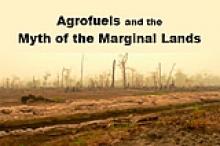
It is claimed that growing agrofuels on marginal lands will bring development benefits to Southern countries, while avoiding the negative impacts on forests, food security, climate change and land rights, brought about by agrofuels so far. But a closer look finds that growing on “marginal” lands will not avoid these problems, but exacerbate them. Much of the discussion about “marginal” lands has ignored the presence of pastoralists, indigenous peoples, small scale farmers and women on these lands, and failed to understand that intensive agriculture/monoculture is not the only form of land use. Promoting agrofuel development on “marginal” lands will further disenfranchise rural communities. The loss of livelihoods and food security experienced by affected communities undermines claims that agrofuels can bring development benefits. The turning of grasslands and set-aside lands over to agrofuel production will release far more carbon emissions than can be saved through growing fossil fuel alternatives.
Changing the landscape ecology will accelerate local climate change, and further increase pressure on local communities. The potential for marginal dry lands to produce agrofuels on a commercial scale is far from certain. Many companies therefore prefer to move into forested, fertile and well-watered territories, even as they pledge to use only “marginal” lands. In most affected countries, the willingness or capacity of governments to ensure that land rights, critical ecosystems and food security are protected, is woefully inadequate. The drive for agrofuels will therefore accelerate land grabbing at the expense of local communities. Dangerous assumptions have been made about the extent of “marginal” lands and how they are to be defined. New studies are needed to determine who lives on these “marginal” lands, and where, and to what extent genuine wastelands are available. Very little land is truly “marginal”. Land that is “marginal” to one person may be a vital resource to another. The myth of the marginal lands should not be used to justify harmful agrofuel developments.
